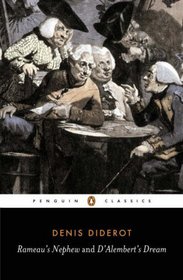Helpful Score: 1
Conversations With Himself?
Both writings are deeply academic and philosophical. In order to appreciate fully these works, some knowledge of the political and cultural atmosphere of the times (1760-1770) is necessary. They are more for the cross-discipline academic than for the casual reader.
D'Alembert's Dream
This starts with a faked conversation between Diderot and his friend D'Alembert (a real person). It switches to a phony dream of D'Alembert. He quite a loquacious sleep-talker incidentally. His dream is shared with two other acquaintances (also real people) of Diderot who continues to manufacture their speech. The author uses this as a vehicle with which to impress the reader with his philosophy and knowledge of life, propagation, sexual alternatives, and reproductive systems. This is a work that would be subject to charges of libel by any standards, as it probably was at the time.
Rameau's Nephew
This is another pseudo-conversation, this time with the nephew of the then famous musician-composer, Jean-Philippe Rameau. The only participants are Diderot (I) and Rameau (He). Or, as this never actually took place, are they both Diderot? At any rate, it is another vehicle through which the author imparts upon the reader his philosophies: this time on music, literature, opera, as well as politics.
Both writings are deeply academic and philosophical. In order to appreciate fully these works, some knowledge of the political and cultural atmosphere of the times (1760-1770) is necessary. They are more for the cross-discipline academic than for the casual reader.
D'Alembert's Dream
This starts with a faked conversation between Diderot and his friend D'Alembert (a real person). It switches to a phony dream of D'Alembert. He quite a loquacious sleep-talker incidentally. His dream is shared with two other acquaintances (also real people) of Diderot who continues to manufacture their speech. The author uses this as a vehicle with which to impress the reader with his philosophy and knowledge of life, propagation, sexual alternatives, and reproductive systems. This is a work that would be subject to charges of libel by any standards, as it probably was at the time.
Rameau's Nephew
This is another pseudo-conversation, this time with the nephew of the then famous musician-composer, Jean-Philippe Rameau. The only participants are Diderot (I) and Rameau (He). Or, as this never actually took place, are they both Diderot? At any rate, it is another vehicle through which the author imparts upon the reader his philosophies: this time on music, literature, opera, as well as politics.




![header=[] body=[Get a free book credit right now by joining the club and listing 5 books you have and are willing to share with other members!] Help icon](/images/question.gif?v=90afaeb39)
